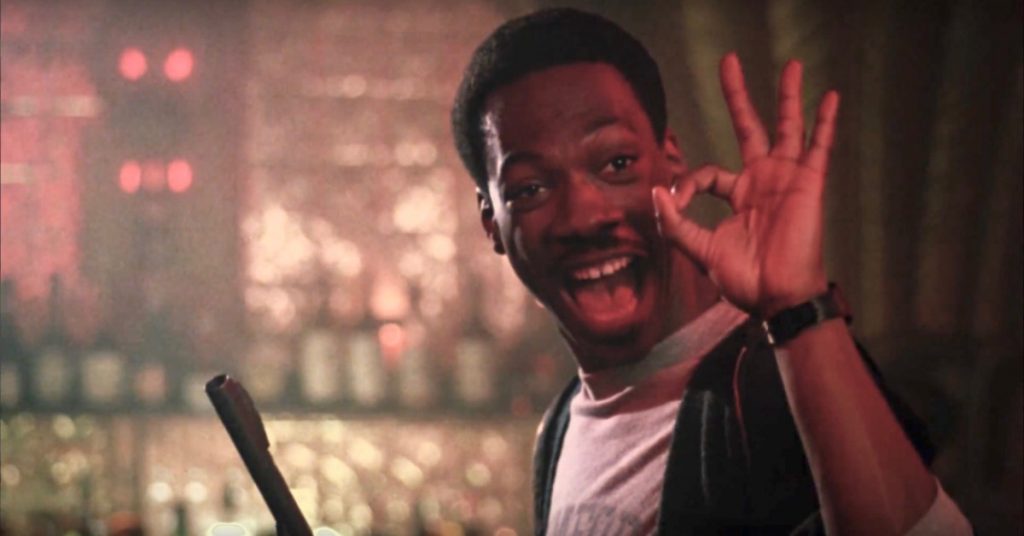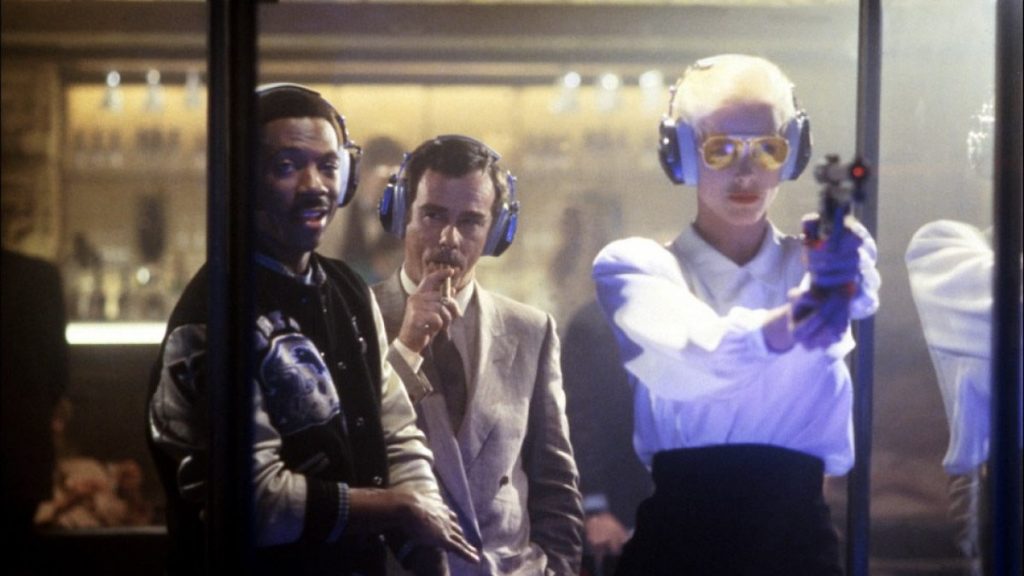In the ’80s, there were few, if any superstars as big as Eddie Murphy. Appearing in a string of hits, including Trading Places, the 48 Hrs. series and Coming to America, he was a far cry from the film flops that marred his later career. However, none of his films were bigger than Beverly Hills Cop, a film that perfectly showcased Murphy’s motormouthed talents. The film was successfully followed up with an action-packed sequel helmed by the legendary Tony Scott. The third film – well, let’s just focus on the first two, shall we?
Beverly Hills Cop (1984)

Story: The story is a classic ‘fish out of water’ scenario, while also playing on archetypes and familiar tropes. Murphy’s Axel Foley is a street-smart cop from the mean streets of Detroit, a place where rules are arbitrary on both sides of the law. As a cop, this means you do whatever means are at your disposal to get the job done. As soon as Foley arrives in Beverly Hills, it’s like he’s in a whole new country. Everything is bright, colourful and exaggerated, a stark contrast from the dark, gritty Detroit we see earlier in the film. While the actual investigation is pretty straight-forward and there are few surprises, but the point of the story is to contrast Murphy’s clever approach versus the straight-laced Beverly Hills PD. In this regard, the movie is endlessly entertaining as Taggert and Rosewood are perfect foils to Foley, and we delight in seeing Eddie Murphy school the supporting characters (and the audience) on the possibilities that open if you are brave enough to challenge civilized conventions.
Villain: Steven Berkoff is excellent as the villain Victor Maitland. Calm, controlled and cultured, Berkoff’s piercing blue eyes seem to stare into everyone he speaks to, and it seems foolish to try and lie to this man. The scene where he is questioning Jenny if she knows Axel Foley is uncomfortable as you know she’s lying and you’re worried that Maitland knows as well. He rarely raises his voice, but you always get the sense that he is barely holding back his rage. Jonathan Banks, who is always great as a heavy, is the perfect conduit for the violence just below the surface of Maitland’s persona, and his dead-eyed stare is overtly menacing.
Action: The movie is a little light on action scenes, focusing more on the comedic interactions with Murphy and the rest of the cast, with two notable exceptions: the opening truck chase and the final assault on Maitland’s Beverly Hills estate. The opening scene is extremely satisfying, especially if you are a veteran of urban gridlock as you can live vicariously through the armoured truck smashing through myriad cars. The final scene is impressive in the gunplay but is nothing especially memorable or interesting, other than it shows that Foley can back up his never-ending chatter with serious skills.
Beverly Hills Cop II (1987)

Story: The second film takes a step forward from the first film in the sense that the criminal activities are more involved and intricate and there are more considerations in regards to the new political climate of the Beverly Hills police department, which serves to provide another obstacle to the heroes. This leads to more actual police work, which was the only move the movie could really make, as most of the ‘fish-out-of-water’ material had been exhausted in the first film. However, the other edge of that particular sword is the characters have to explain the criminal’s motivations (especially at the end of the film), which takes away from the audience discovering the plot for themselves, which they could with the first movie. The politicization of the police department was another smart move, as it presents more problems that have nothing to do with the bad guys, leading to Taggert and Rosewood having to act more like Axel to get the job done. It was a nice evolution from the first film and showed the filmmakers weren’t going to rely on the same formula as the first film (with a few minor exceptions).
Villain: Jürgen Prochnow plays the chief villain in this film, but he’s basically a carbon-copy of Victor Maitland, albeit with less menace and screen time. Dean Stockwell is a secondary villain that never really rises above “stock bad guy” status. Nope, the real villain and the real stand-out in this film is Brigitte Nielsen – she’s literally the first bad guy on the screen and the last one at the end of the film. Nielsen’s amazonian villainess oozes presence, and the film uses her smartly, using her natural height advantage to show her literally and figuratively towering over the other characters. She is given everything noteworthy for the villains to do in the film – she is the one who executes the heists and shoots Ronny Cox’s character. Her ice-queen persona and intimidating, sleek look make her a formidable opponent.
Action: The action in this film easily outpaces the original film, with the number of action scenes doubling (at least), with more chases, gunplay, and originality than the first film. This time, there is a significant chase with a cement mixer, with the good guys causing all of the destruction as opposed to the villains. It’s probably one of the few times you’d see that type of vehicle involved in all that mayhem. The end sequence, while another storming of the bad guys’ hideout, has more gunplay and just more guns in general. You also get a nice stunt including an exploding car in the climax of the film. While there have been more elaborate action sequences with films in later years, this film has some solid sequences to keep the audience satisfied.
The Verdict
This is a tough one, as I feel the movies were trying to achieve two separate goals – the first one was more focused on the comedic aspects of Murphy’s performance, while the second one was more a traditional, detective action film. At the end of the day, I’ll give it to the second one by a hair, only because of the uniqueness of Brigette Nielsen’s character, the better action sequences and the fact the film didn’t lose too much of what made the first film entertaining while adding additional layers to it. That being said, on a lazy Sunday afternoon, you could do far worse than sitting down on the couch, grabbing some popcorn and enjoying some 80s Eddie Murphy when he was at the pinnacle of his career.






